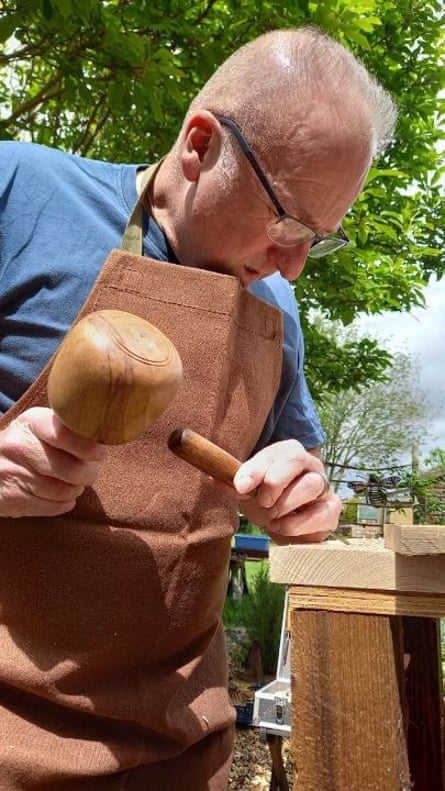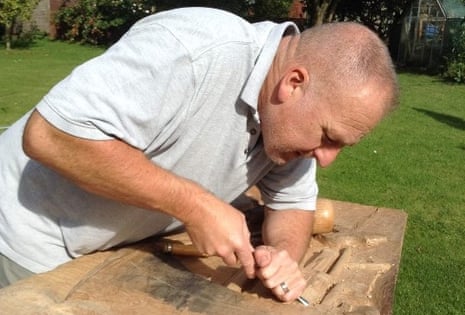One night in 2011, I woke up in an ambulance. I had gone to bed as normal, and the next thing I knew I was in a stretcher, my wife at the end of it, crying. I’d had a seizure in the middle of the night. An MRI scan and other tests showed that I had MS and epilepsy.
That year, my brother-in-law had died of a heart attack, and not long after I was diagnosed, my sister was diagnosed with cancer. She died in the middle of 2012, and I lost a good friend around the same time. I was struggling to get to grips with my illness – by then, I’d had another significant seizure – and cope with grief.
I had been in the Royal Air Force Regiment, and then worked for the tea and coffee company Whittard of Chelsea – but when I was diagnosed I was a police officer, and my illness affected my work. I lost my driving licence due to the epilepsy, which meant I lost my ability to respond to the wider community using patrol cars. Luckily, a couple of years earlier, when I was the bobby on the beat for Holbeach, Lincolnshire and the local area, I had been able to secure funding for mountain bikes, so at least I had an official form of transport. But there wasn’t a lot to do without a car so I was relocated to Spalding, a bigger town nearby.
After two years I got my driving licence back, but then I was diagnosed with sleep apnoea, where you stop and start breathing during sleep, and lost it again. The MS affected my “executive functioning” – things such as memory, focus and multitasking – so moving into another department, such as criminal investigations, where there is a lot of admin and having to remember critical information, would have been impossible. I enjoyed community policing, but because of the epilepsy, my equipment – baton, Taser and handcuffs – was taken away. It felt as if I didn’t have many options.

I retired a month before my 50th birthday with no idea what I would do next. The impact of the previous few years had left me in a chaotic place, mentally. I tried to keep busy with running, cycling and in my role as a school governor – but it was a difficult time. My wife was at work, and our two children were at primary school, and being on my own was hard.
One day my wife saw a post on Facebook by Transported, a Lincolnshire organisation that runs community art projects and encourages people to come along and have a go. In this case, it was woodcarving and if you liked the initial session, you could stay on to make some wooden signposts in a country park.
The first piece I carved was an oak leaf into a piece of wood, a fairly simple shape with undulations and veins. I was extremely happy with it. Looking back, I can see that it is a first attempt at carving, but I’m proud of it. I joined the longer project so I had something to look forward to every week. It lasted about six weeks and we carved signs for the country park – mine was a sign pointing towards the river. We decided to stay together after the project and made a carving, over several panels, of the Boston Stump, St Botolph’s church in Boston, Lincolnshire, which now stands on the riverbank. Then we carved a tribute to the fishers and trawlermen of Boston, which sits just across the river, on 4ft-high oak panels.
It made me feel amazing. I loved learning about the traditional skills and tools – a mallet and gouges of different shapes and sizes – that had been used by carvers for centuries. We worked in a beautiful woodland setting, with people – led by a carver called Peter Tree – who had a passion. We carved and drank tea using a wood-fired kettle, and it felt like a magical space. I found I could go off into a different world, immersed in something creative. You concentrate hard, it evolves and when you take a step back, you think: ‘Wow, I did that,’ as the shape emerges. Learning something new took me away from the uncertainty of my life – it was an escape.
In 2019, I started training to become a forest school practitioner, which seemed like a natural progression from what I had learned from Peter, and the whole experience of being in the woods. The same year, an opportunity came up with Transported to become a project assistant. Now I work on projects throughout the year – setting up, helping the artists or participants, engaging with members of the public and encouraging them to have a go.
I do my own carving and friends have asked me to make pieces for them. I’m also supporting Peter on a new woodcarving project for a river walk. Being an ex-soldier, and an ex-policeman, I could never have imagined that I would become immersed in the arts in the way that I have. When we did the fishers tribute, I drew a trawler, transferred it on to the wood and carved the panel – I could never have done that two years earlier. I have pieces of public art in Boston, where I can say: ‘That’s mine, I did that.’
I have relapsing remitting MS, so it wakes up, attacks and goes to sleep. I am fortunate that I still have mobility, but I get spasms on the left side of my body, my toes on my right foot are numb, and it affects cognitive functioning. There are people in far worse situations. I find the woodwork helps. I am exercising my brain because I’m concentrating on one activity, and switching off to the outside world and anxieties. It’s also physical, adjusting the pressure on the gouges, and some of the panels are large so lifting them feels like good exercise. I now can’t remember how stressful it was in that early period when I was diagnosed, because this turned my life around. For me, it was the right people at the right time with the right project.
Transported is funded by Arts Council England’s Creative People and Places programme
